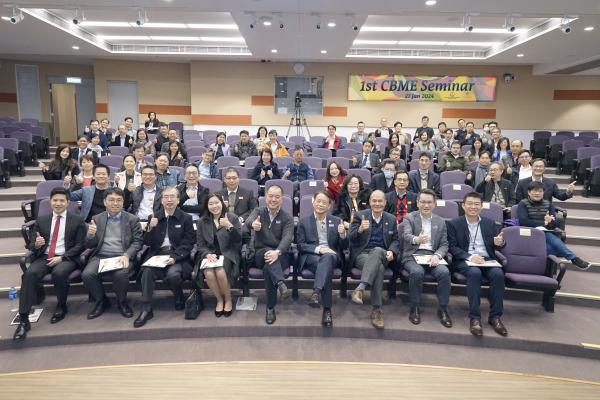First CBME Seminar
Breadcrumb
- Home
- Latest News
- First CBME Seminar
The need for competency-based medical education (CBME) in postgraduate medical education (PGME) was identified during the Tripartite Medical Education Conference (MEC) in Jan 2023 and the Strategic Planning Retreat on Education and Training in March 2023. The Hong Kong Academy of Medicine (HKAM) published the Position Paper on Postgraduate Medical Education 2023 in Sept 2023, which included 11 recommendations, three of which focused on CBME.
It is the direction for different Colleges to move towards the CBME approach progressively, instead of the traditional time-based framework. The Academy, therefore, decided to organize two CBME Seminars in response to the recommendations and build the capacities of our trainers and trainees to prepare for the change. The first seminar was held on 27 Jan 2024.
Prof. Gilberto Leung, President of the Academy, delivered the welcome remarks and emphasized the importance of CBME in postgraduate medical education (PGME) and the Academy's commitment to promoting new ideas and training. He highlighted the Academy's leadership role in the region and the need to revise the Position Paper for postgraduate medical education. During the Seminar, Prof. Philip Kam-tao LI (Vice President (EE) of HKAM) and Dr. Hing-yu SO, Educationist, facilitated the sharing of experience of implementation of CBME from 7 Colleges’ representatives.
Welcome remarks by Prof. Gilberto Ka-kit LEUNG, President of the Academy
Facilitators: Prof. Philip Kam-tao LI, Vice President (EE) of HKAM, and Dr. Hing-yu SO, Educationist
HKCA (The Hong Kong College of Anaesthesiologists):
Dr. Albert Kam-ming CHAN provided an overview of HKCA's curriculum and the progress made in implementing a competency-based approach. He discussed infrastructure development, stakeholder engagement, and workplace-based assessments (WBA). Future plans include capacity enhancement, curriculum review, and interprofessional collaboration.
Dr. Albert Kam-ming CHAN, HKCA’s sharing representative
HKCEM (Hong Kong College of Emergency Medicine):
Dr. Chun-tat LUI discussed HKCEM's competency-based curriculum, focusing on progressive stages of emergency medicine training. He highlighted the importance of workplace-based assessments, EPA, and the development of a comprehensive ePortfolio. The curriculum also emphasizes research requirements and faculty development.
Dr. Chun-tat LUI, HKCEM’s sharing representative
HKCOG (The Hong Kong College of Obstetricians and Gynaecologists):
Dr. Daniel Lin-wai CHAN and Dr. Wing-lam CHEUNG provided an update on HKCOG's curriculum review. They discussed the current training structure, workplace-based assessments, and proposed changes to incorporate non-technical skills, team observation, and competence-based assessment. The emphasis is on reducing experience requirements and increasing summative assessments.
Dr. Daniel Lin-wai CHAN & Dr. Wing-lam CHEUNG, HKCOG’s sharing representatives
COHK (The College of Ophthalmologists of Hong Kong):
Dr. Robert Fung LAM presented the revised training curriculum for ophthalmology, which focuses on outcomes-oriented design and assessment of skills, attitudes, and professionalism. The curriculum review includes strengthening core areas, accrediting training centers, and formative and summative assessments of trainees' abilities.
Dr. Robert Fung LAM, COHK’s sharing representative
HKCORL (The Hong Kong College of Otorhinolaryngologists):
Dr. Eddy Wai-yeung WONG discussed the ENT training program, emphasizing workplace-based assessments (WBA) and procedure-based assessments (PBA). He highlighted collaboration with HKJC ILCM and outlined future plans for workshops, teaching material development, and engaging trainers and trainees as faculty.
Dr. Eddy Wai-yeung WONG, HKCORL’s sharing representative
HKCPaed (Hong Kong College of Paediatricians):
Dr. Shun-ping WU provided an update on HKCPaed's curriculum review, which aligns with RCPCH and Hong Kong Doctors guidelines. The curriculum covers eleven domains and proposes four formative assessment tools. Faculty development through the Basic Medical Education Course (BMEC) is also emphasized.
Dr. Shun-ping WU, HKCPaed’s sharing representative
HKCPath (The Hong Kong College of Pathologists):
Dr. Siu-ming MAK discussed the introduction of CBME to the College. Key stakeholders were engaged in the revision process, focusing on workplace-based assessment, assessment dimensions, trainees' exposure, and technology adoption. Insights from overseas Pathology Colleges were valuable. Challenges in change management were discussed using the ADKAR Model, emphasizing awareness, desire, knowledge, ability, and reinforcement.
Dr. Siu-ming MAK, HKCPath’s sharing representative
After the productive sharing sessions, representatives from 15 Colleges participated in an open and constructive discussion. They actively exchanged and shared their valuable experiences regarding different aspects of CBME. The seminar, as a whole, offered valuable insights into the implementation of CBME in various medical specialties. It provided an opportunity for the Colleges to exchange experiences, identify challenges, and present their future plans for enhancing competency-based medical education in Hong Kong. The Second CBME Seminar has been scheduled for August 31, 2024.
Raising questions and suggestions: Dr. Yu-fai CHOI
Raising questions and suggestions: Prof. LAM Hugh Simon Hung San
